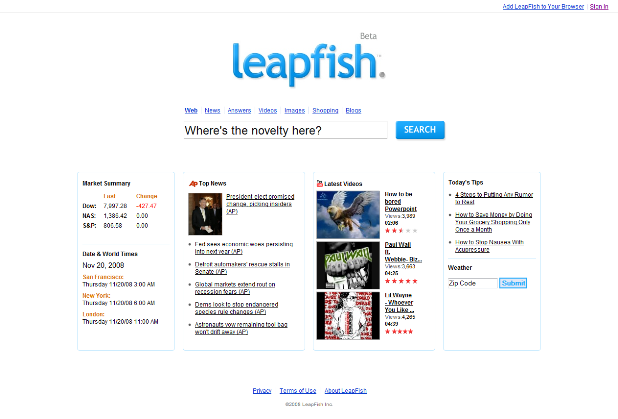 Last I heard about Leapfish (this was a couple of years ago), they ran a useless but fun tool that provided you with a free appraisal for your domain name based on a variety of ratings and criteria. Now they’re back with an equally useless tool, this time without the fun part.
Last I heard about Leapfish (this was a couple of years ago), they ran a useless but fun tool that provided you with a free appraisal for your domain name based on a variety of ratings and criteria. Now they’re back with an equally useless tool, this time without the fun part.
The company just revamped itself under the ownership of California-based DotNext, morphing into what they refer to as a “multi-dimensional information aggregator,” which is actually nothing more than yet another meta search engine. You know the kind: sites that pull together search results from real engines like Google, MSN, and Yahoo and attempt to differentiate themselves by adding tabs for meta-searching images, videos, Q&A, blogs, and so on. Leapfish also displays a number of static, non-customizable widgets on their homepage for the latest news, weather reports, and a stock market summary, which is a kind of step backwards from all the start page personalization efforts we’ve seen over the years.
The company is actively contacting potential advertisers to buy keywords for top positions in their search result listings for a flat fee—typical registration fees are reportedly around $1000 and there’s a yearly renewal fee of 5% of the amount spent —which would give them a “lifetime” guarantee for a top slot for that keyword, but they also get the opportunity to resell it later to another advertiser. Of course, this is only beneficial if Leapfish becomes big, and the chances for that are slim.
The premise of meta search engines is that the aggregation process digs up the most relevant results across different sites and technology platforms, all on a single page. What I want to know: if these meta search engines (and boy, are there many) deliver significantly better results or a greater experience than a Google’s or Yahoo’s core search technology can on its own, then why doesn’t everyone flock to them instead?
The answer: people don’t want to get as many search results as possible and they don’t care about how large the unindexed part of the internet is, let alone what they might find on this so-called “invisible deep web.” All they want is a quick, convenient way of obtaining decent information from a source they know and trust. Or do you honestly visit Search.com, Dogpile, Zuula, Fazzle, Clusty or Mamma.com to get what you need? (I can go on with this list forever, but ask Mark Cuban about how much that last one is worth).
Don’t get me wrong: I see the value of startups trying to improve search and driving innovation both on a technology and a business level, and I’m sure some will be able to compete and carve out their piece of the market. In fact, I hope some of them will. Because no matter what your opinion is on human-powered search, semantic search, vertical search, or social search engines, you have to admit several companies in that space are trying to push the envelope, often drawing attention from the big guys or keeping them honest at least (see yesterday’s announcement about Yahoo Glue, for example).
For me, though, wanna-be search engines like Leapfish don’t clear that hurdle.
